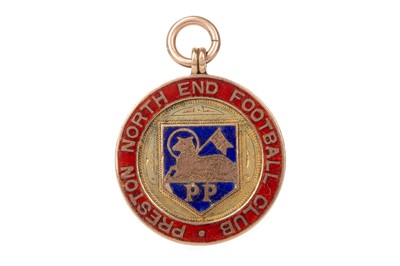11th Apr, 2024 12:00
The Sporting Auction | Part One
JAMES TAYLOR OF PRESTON NORTH END F.C., LIFE MEMBERSHIP GOLD MEDAL
24TH JUNE 1936
the obverse with enamelled crest and inscription, the reverse inscribed and dated, in nine carat gold
Note: As per Prof. Matt Taylor via the LCFC website,
'James Isherwood Taylor was a lifelong supporter of Preston, having watched the team since the days of the league and cup double-winning ‘Invincibles’ in the late 1880s. Technically he was a director who was also responsible for team affairs at a time when many clubs were appointing specialist managers.
Indeed, most historians don’t recognise him as a Preston manager at all, preferring to see the years 1932-36 and 1937-49 as a time when they were without a manager. Yet Taylor was a crucial figure in North End’s history.
He first joined the Deepdale board in 1912, helping Preston gain promotion to the First Division in 1912/13. He also played a pivotal role in building the squad that reached the FA Cup Semi-Final in 1921. He resigned from the board in 1921 after a dispute with the shareholders’ association but was persuaded to come back four years later with the club back in the Second Division.
In 1931, with Preston close to relegation to the third tier, Taylor adopted a progressive policy that, according to one account, ‘saved the club’. Promotion back to the top flight followed in 1933/34 and in 1937 and 1938 Preston achieved back-to-back FA Cup final appearances. They defeated Huddersfield Town 1-0 in the 1938 final (pictured above) and came within a whisker of topping the league to achieve a second double.
Taylor had become the most powerful figure at Deepdale long before he first assumed the role of ‘director-manager’ in 1932. Few of the early Preston managers had much power, as Taylor and his fellow directors generally bought the players, selected the team and organised the tactics. Tommy Muirhead’s controversial managerial resignation just days after he had steered the club to the 1937 final was allegedly provoked by Taylor interfering with his tactics.
In 1937, Taylor was back as ‘director-manager’ and chairman, roles he maintained for the next 10 years. He was supported by trainer Will Scott, who helped him maintain good relations with the players. While he never played at the highest level, Taylor was tactically astute and a good judge of a player. It was he who spotted the great Tom Finney in a trial match and later advised the player to switch from inside forward to right wing.
After retiring as chairman in 1950, Taylor was made president of the club. He died five years later after a long illness. Announcing his death, the Lancashire Evening Post described him simply as ‘the builder of modern North End’.'
(approx. 18g)
A condition report is offered as an indication of any issues visible to the naked eye. As none of our staff is a professional conservator or restorer, buyers must satisfy themselves in respect of condition. The condition report does not form part of any contract between McTear's and the buyer, and all lots are offered "as is" in accordance with our Terms of Business available on our website.
Sold for £280
Estimated at £200 - £300
Request a free auction estimate
Complete the form below and one of our specialists will get back to you.


